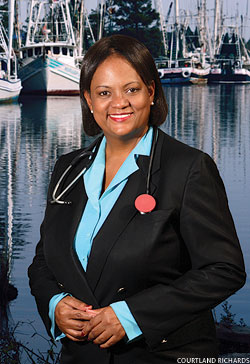Bringing Health Care to People in Need
By Russ Willcutt
 |
Growing up in Daphne, Alabama, Regina M. Benjamin, M.D., never thought about becoming a physician. “I’d never seen a black doctor before,” she says, “so I didn’t realize that was something I could do.”
The revelation came during Benjamin’s undergraduate years at Xavier University in New Orleans, when she joined a “pre-med club” while working on her bachelor’s degree in chemistry. She was then accepted into the second class at the Morehouse School of Medicine in Atlanta, which had an agreement with the UAB School of Medicine allowing its students to spend their final two years in Birmingham. Benjamin received her medical degree from UAB in 1984.
After completing her family-practice residency in Georgia, Benjamin decided to return to her south Alabama roots, establishing a solo practice in Bayou La Batre. It really was a one-woman show: She secured the capital, hired the contractor, and equipped the facility on her own. For years afterward she moonlighted in emergency rooms and nursing homes to earn the funds necessary to keep the clinic open.
At the same time, she was pursuing an M.B.A. at Tulane University, which she received in 1991. “My goal is to find a way to provide the best possible medical care to patients who often can’t afford health insurance,” she says, “and the only way to do that was to learn how to run a business efficiently.”
After discovering a little-known law that allows a private physician to establish an independent—rather than a provider-based—rural health clinic, Benjamin converted her solo practice into Alabama’s first clinic of that type in 1992. In 1998 she made another transition, with the clinic evolving into a nonprofit organization.
Benjamin has struggled with numerous challenges, especially the near back-to-back blows dealt by Hurricane Georges in 1998 and then Katrina in 2005. Both storms heavily damaged the clinic, but Benjamin was able to rebuild. Then came a fire this past New Year’s Eve, which completely razed the structure. “The good news is that we’ll have a new building,” she says, “and the new codes dictate that it must be 13 feet high, so maybe we’ll weather hurricanes a little better in the future.” Still, there are many expenses that insurance will not cover—such as an elevator to provide disabled patients with access to the clinic—so Benjamin is once again putting her business and political savvy to the test in order to raise funds.
Luckily she’s well connected and very well known. She is a past president of the Medical Association of the State of Alabama—its first female and first African-American president—and the first person under the age of 40 to sit on the board of trustees of the American Medical Association (from 1995 through 1998). Her work has captured the attention of national publications, including The New York Times, Time, People, and Reader’s Digest.
While they wait for the new clinic to be built, Benjamin and her staff are seeing patients in a trailer, but that’s nothing new. “We’ve been here before,” she says with a sigh. “We got through it then, and we’ll get through it now, too.”
—This article originally appeared in the fall 2006 issue of UAB Magazine
More Information